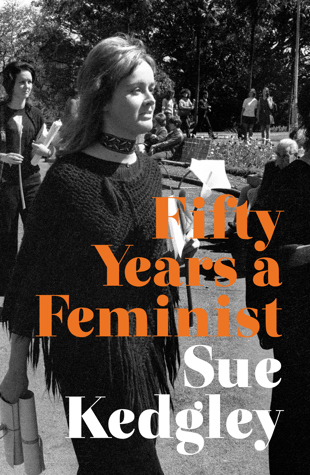Sue Kedgley’s Fifty Years a Feminist has been reviewed by Charlotte MacDonald of Te Herenga Waka — Victoria University of Wellington. In the latest issue of the New Zealand Journal of History, she writes:
‘For Sue Kedgley, sisterhood was always deeply personal. She was an identical twin, born five minutes after her sister, the two being “inseparable” well into their university years. Until Kedgley picked up a copy of Robin Morgan’s Sisterhood is Powerful in the Brisbane airport bookshop in February 1971, it was a sisterhood of kin and largely of convention. That changed rapidly and dramatically. As one of the core group who called a women’s liberation meeting at the University of Auckland in 1971, Kedgley was quickly at the forefront of a movement that grew exponentially, radically transforming the lives of New Zealanders and the society around them.
Spurred by a realisation of 50 years passing since those exhilarating beginnings and concerned that the history of women’s activism might already be lost to subsequent generations, Kedgley has set down a personal history. Fifty Years a Feminist provides a spirited account of an energetic campaigner, first in early 1970s Auckland campus radicalism, as well as in launching the broader-based National Organisation of Women (with a membership of hundreds across many branches); for nearly a decade, c.1973–82 at the United Nations in New York working on the international stage to make women’s equality a global priority; back in New Zealand in the 1980s in television and film; and in the 1990s and early 2000s within local and central government as a Wellington city councillor (1989–1999) and member of Parliament (1999–2011) in the Green Party.
Capturing a world in which it was preposterous for a qualified woman to hold a reporting rather than backroom job on current affairs radio, where no woman presided over a courtroom at any level, and when it was still the norm for women to leave work at marriage or when pregnant, Fifty Years is both hilarious and frightening in depicting the scale and pervasiveness of the male dominant world fully intact in 1970. To begin to dismantle it took courage, energy and creativity. Sue Kedgley had all of those.
Some of what have come to be iconic episodes in New Zealand’s late twentieth-century history: the “liberation” of the public bar at the Great Northern Hotel on a Friday afternoon in 1971; the Suffrage Day protest at which Kedgley and others dressed in black and carried a coffin to the statue of Queen Victoria in Albert Park to mourn the lack of progress women had made since 1893 (featured on the book’s cover); and the bizarre carnival that was Germaine Greer’s March 1972 visit to New Zealand, are told here through the eyes of the insider. Kedgley takes us to the centre of these events, all of which she was instrumental in imagining and in making happen.
While such events propelled women’s liberation to the front page, feminist protestors were more often met with ridicule than with the serious contest provoked by anti-racist and anti-war demonstrators of the same era. To the New Zealand Herald, the 1971 Suffrage Day protestors were no more than “attractive young things” (p. 79). Such reporting was common and Kedgley drew a disproportionate share of such attention. Her transformation from a camel-coat wearing debutante to straight talking women’s liberationist was irresistible fodder for a media little less than predatory in pursuing young women as “stories”.
In New York, Kedgley played a key part in supporting the 1975 International Women’s Year conference held in Mexico City. Part funded by Princess Pahlavi (twin sister to the then Shah of Iran), the conference brought together government delegates and community activists. Despite geopolitical and other differences, there was a common desire to work for women’s greater equality and what would come to be called empowerment. Kedgley draws attention to the interplay between internationalist pressure and national political interests that can prove critical in driving social and political change on the ground. New York also provided Kedgley with the life of a freewheeling professional woman, the kind which might, previously, have only been enjoyed by young men.
At various points through the book, Kedgley expresses surprise at her younger self. She is nonplussed as to why she did or did not do (or say) certain things. In this respect her memoir can be read productively in tandem with Margaret Wilson’s Activism, Feminism, Politics and Parliament, also published in 2021. Very close in age cohort, both active at Auckland University in the early 1970s, and both later MPs in the same parliament (though for different parties), Kedgley and Wilson’s lives run in parallel. Wilson’s “political life” is highly deliberative. Her searching analysis of power, the paths open to men and women, to working inside or outside of “the system”, of anatomising when and how change can and has been achieved (or blocked), and her place in all those nexuses, is plain before us.
Memoirs written by Kedgley and Wilson are of particular value to nistory. They document how the process of personal transformation enabled a watershed moment in which a generation profoundly shifted the ways in which men and women were able to live in the world.’


